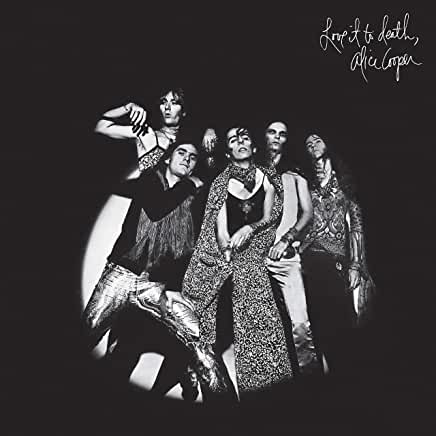(Album ©1971, Warner Bros. Records)
Alice Cooper was a band out of Phoenix that  evolved slowly through the mid to late-’60’s, finally settling on a name that they thought sounded innocent, a “sweet little old lady name” that would contrast with their music and stage show. They were initially signed on Frank Zappa’s Straight Records and released two largely forgettable albums in 1969 and ’70.
evolved slowly through the mid to late-’60’s, finally settling on a name that they thought sounded innocent, a “sweet little old lady name” that would contrast with their music and stage show. They were initially signed on Frank Zappa’s Straight Records and released two largely forgettable albums in 1969 and ’70.
Then, in 1970, the band moved back to lead singer Vincent Furnier’s hometown, Detroit, Michigan, where the burgeoning hard rock scene was exploding, led by the Stooges and the MC5. They connected with up-and-coming producer Bob Ezrin, who had the band actually rehearse their new tunes to get them into shape. In fact, they recorded their best of the new songs, “I’m Eighteen,” and released it as a single to gauge the public’s interest in their improved sound. Apparently, there was interest, as the single hit #21 on the Top 40 chart, which got the third record green-lit by Straight/Warner Bros.
The album was released in early 1971 and sold quickly, reaching as high as #35 on the Billboard 200 Album chart, earning Gold Record status before the end of the year. Along with the band’s outrageous stage show, their new album established Alice Cooper as one of America’s biggest hard rock acts, up with Led Zeppelin, Deep Purple, and Black Sabbath. Moreover, this record was an early influence on both Heavy Metal and Punk music. It was included in the Rolling Stone 500 Greatest Albums of All-Time list (#454) and “I’m Eighteen” was quoted as the reason Pat Smear learned to play guitar and form The Germs, the song the Ramones ripped off with their first song, “I Don’t Care,” and the song that John Lydon supposedly used as his audition song for the Sex Pistols. Anthrax covered it on their first album. The Melvins covered “Second Coming” and “The Ballad of Dwight Fry” on 1992’s Lysol album. Sonic Youth covered both “Hallowed Be My Name” and “It It My Body at various times. This album has influenced generations.
As with many of the albums on this list, the third album was not Alice Cooper’s magnum opus, but was the record where the band established it’s sound on record, and was the springboard to their biggest album, in Alice’s case, 1973’s Billion Dollar Babies. The formula was laid out on Love It to Death.